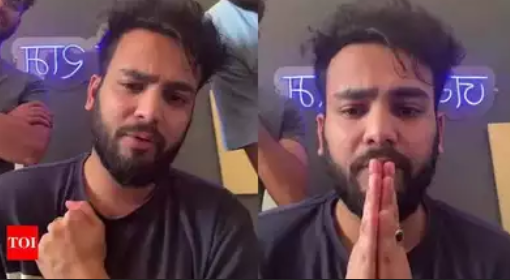In a recent turn of events, popular YouTuber and winner of Bigg Boss OTT 2, Elvish Yadav, finds himself embroiled in a controversy as he faces allegations of organizing a rave party with the involvement of snake venom in Noida. However, Yadav vehemently denies these charges and has expressed his willingness to cooperate with the authorities amid the ongoing investigation.

The Controversy Unfolds:
The controversy began when the Noida Police booked five individuals in connection with a rave party that was allegedly organized by Elvish Yadav. During the raid, the police claimed to have recovered nine snakes, which further intensified the allegations against him. While the situation may seem alarming, Yadav has come forward to clarify his stance and refute the accusations made against him.
Yadav’s Denial and Cooperation: In response to the allegations, Elvish Yadav stated, “All these accusations of me being arrested for consumption or acquisition of substance are untrue. I am ready to cooperate with the Noida police and UP CM Yogi Adityanath. If I am found even 0.1% involved in this, I am ready to take responsibility.” This strong denial is a clear indication of his willingness to address the issue and clear his name.

The Role of Snake Venom:
The involvement of snake venom in the alleged rave party adds a concerning dimension to the case. BJP MP Maneka Gandhi, whose NGO filed the complaint, emphasized the seriousness of the matter, stating, “This is a grade 1 crime, seven years in jail, a wildlife crime. King cobras die when their venom is taken out. Their venom is for digesting food. Without the venom, they can’t eat anything and thus they die. There are very few cobras and pythons in the country. It is a crime to own them, catch them, or use them.” This sheds light on the potential ecological and legal ramifications of the incident.
The Complaint by People For Animals:
The complaint against Elvish Yadav and the other individuals involved in the alleged rave party was filed by People For Animals, an animal welfare NGO. According to the complaint, the NGO had contacted Yadav to organize a rave party and procure cobra venom. The complaint further stated, “Elvish gave us the name of one Rahul whom we contacted. He said he could organize the venom wherever we want. He then came to Sector 51 Banquet Hall with the venom. The Noida police then came to the venue along with the DFO and arrested the organizers.” This account provides a glimpse into the events leading up to the police raid.
Legal Implications and Wildlife Conservation:
The allegations surrounding the use of snake venom in the rave party raise significant legal and wildlife conservation concerns. Wildlife crimes, especially those involving endangered species like cobras, are taken very seriously by authorities. The capture and use of these animals can have severe consequences for the ecosystem and the animals themselves. Additionally, illegal possession of snake venom is a crime in many countries, as it poses significant health risks to humans and can be detrimental to the survival of snake species.
Media’s Role and Responsibility:
Elvish Yadav has also urged the media not to jump to conclusions without proper evidence and proof. This brings to light the importance of responsible journalism and the need for thorough investigation before making accusations that can tarnish someone’s reputation. It is crucial for the media to report facts accurately and ethically, especially in sensitive cases like this one.
Public Reaction and Support:
The allegations against a well-known YouTuber and public figure like Elvish Yadav have naturally garnered significant public attention and reaction. Social media platforms are flooded with discussions, opinions, and support from fans and critics alike. The controversy serves as a reminder of the influential role that social media and public sentiment play in shaping public figures’ fates.

Conclusion:
The controversy surrounding Elvish Yadav and the alleged rave party with snake venom in Noida has raised several pressing questions about wildlife conservation, legal implications, responsible journalism, and the power of public opinion. As the investigation unfolds, it remains to be seen how the legal system will address this issue and whether Elvish Yadav’s claims of innocence will be substantiated. The case serves as a reminder of the importance of responsible conduct and ethical reporting, and it highlights the need for greater awareness of wildlife conservation to protect our planet’s precious species.








